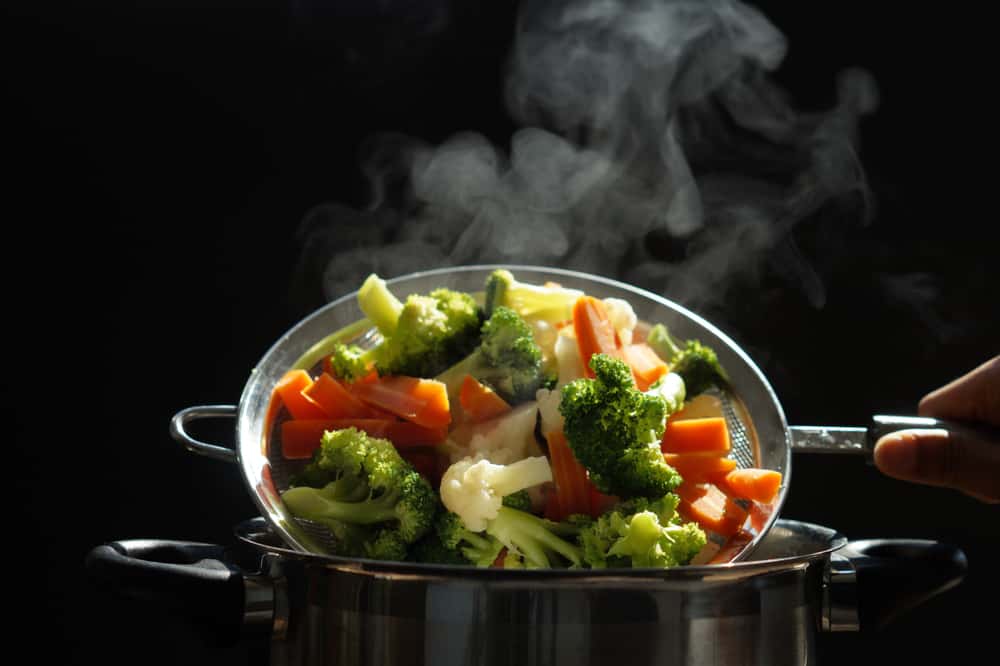Last Updated on 22nd April 2022 by
While many of us will eat veggies because we love them, a lot of times people will just add veggies to their meals simply to get more nutrients in what they’re eating.
Vegetables are a great source of essential vitamins and minerals, like zinc, iron, and vitamins A, B, and K. However, if you’re not cooking vegetables properly, you could be robbing them of precious nutrients.
It doesn’t make sense to eat veggies for your health and then cook them in a way that destroys a lot of what’s healthy about them. Some cooking methods are better than others for preserving the nutritional value of vegetables.
I’m going to share with you how to boil vegetables without losing nutrients and offer some tips on how to cook vegetables and keep the vitamins and minerals.
How Not to Cook Veggies for Your Health
Let me just start off by saying there are some ways you shouldn’t prepare vegetables if you’re trying to get at least a decent amount of nutritional value from them.
Frying
While fried vegetables can taste really well and be an excellent way to cook the veggies so that they cook evenly all the way through, it’s not a very healthy way to cook your food.
Frying usually imbues the food with a lot of fatty components, clogging your heart and arteries and creating an unhealthy dish.
Fat soluble vitamins that include vitamins A and E actually diminish when fried. Your vegetables are robbed of these essential vitamins when you fry your food, but B complex vitamins that are water soluble tend to stay in the food well during frying.
Just know that when you fry your veggies, you’re increasing the calorie content, cholesterol, and fat, and the longer you fry your foods for, the worse off you’ll be.
Overcooking
No matter what cooking method you use for your vegetables, be careful about overcooking them. Not only does this rob them of their texture and flavor, but it also destroys the vitamins and nutrients in your vegetables.
As the vegetables cook for longer, many of the nutrients can dissolve into the water, seeping out from your food. Pay close attention to the recommended cook time and try not to go over that.
Also consider the temperature you’re cooking your veggies at so that you’re not destroying their nutrients.
Keep Water to a Minimum
On its own, water is healthy and a good source of nutrients, but when you combine it with vegetables and start cooking the two together, it will have an effect on the nutritional value of your food.
The longer you cook your vegetables in water, the more nutrients you’re robbing them of. The more water you use, the more nutrients you’re taking away as well.
You want to try to only use just enough water for the veggies and not go overboard. Many methods for boiling vegetables require that you just cover the veggies in water in a pot or saucepan. Any more water than that is unnecessary and will cause you to lose out on some nutrients.
The same is true when you’re cooling your vegetables. You may be used to cooling off vegetables quickly in an ice bath, but there’s a lot of water there, and that similarly robs the veggies of their nutrients.
Instead of an ice bath, layer hot vegetables out in a single layer at room temperature and allow them to cool naturally. They will retain a lot more nutrients that way.
Maximize Iron Intake
You can find iron in a lot of vegetables, including broccoli, spinach, and kale, among others. Your body won’t absorb much of the iron, usually.
What happens is that when you cook the veggies and eat them, the iron will pass through without being digested. Your body won’t know how to grab that and use it, and so it passes through unused.
So, how to cook vegetables without losing nutrients like iron? There is a way to maximize how much iron you’re getting from your vegetables though, and that’s by adding a little Vitamin C to your food.
You can do this by sprinkling citrus like lemon or lime zest on your vegetables. This adds some nice flavor to them, and it also makes them a better, more digestible form of iron.
Serve with Fat
How to boil vegetables without losing vitamins and minerals? Some of those nutrients, like vitamin D, vitamin K, and beta carotene, are known as fat soluble nutrients. What that means is that they dissolve well in fat. Without some fat to go with your veggies, a lot of those vitamins will simply pass through your digestive system and not get used.
If you want your body to absorb these nutrients and get them into your bloodstream so you can benefit from them, then you should boil your vegetables and then add a little fat in there, like olive oil, coconut oil, or melted butter.
Even serving them up with a side of meat that still has some of the fat attached can be a great way to maximize the nutritional value of your vegetables.
The sauces you use can add a little bit of fat without being high cholesterol additions. Marinades, vinaigrettes, and dressings usually contain a little bit of fat, and if you use them sparingly, you’ll get a lot more nutrients out of your vegetables and make them taste better. Your body will absorb the nutrients as it processes the fat.
You might think that boiling vegetables is always the best way to go, but you do need to be careful about how much water you’re using and what method you’re using to cook the veggies. How long you cook them for and the heat they cook at are really important as well.
There are good ways to cook up vegetables to keep the nutrient levels high or to bake them, dry fry them, and grill them. You can follow the same rules I’ve given you here to make sure you’re getting the most nutrients from your veggies no matter how you’re cooking them.
I'm Pauline, a mother of four grown children, my passion for cooking stemmed from the joy i get cooking for my family. I love to try new dishes, especially when dining out but creating and sharing my own recipes is my favourite thing to do!



veering
Friday 21st of February 2025
UgzEcIB2Kkk
binance
Wednesday 7th of February 2024
Can you be more specific about the content of your article? After reading it, I still have some doubts. Hope you can help me. https://accounts.binance.com/ar/register-person?ref=JHQQKNKN
binance
Saturday 3rd of February 2024
Thank you for your sharing. I am worried that I lack creative ideas. It is your article that makes me full of hope. Thank you. But, I have a question, can you help me? https://accounts.binance.com/bn/register?ref=IQY5TET4